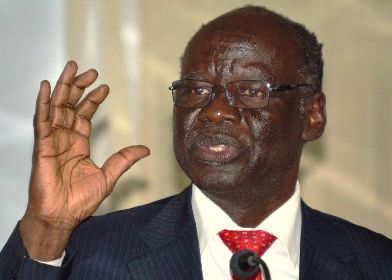South Sudan president relieves Lam Akol after resigning
January 29, 2017 (JUBA)- South Sudan President Salva Kiir has issued an order removed Lam Akol Ajawin from the ministry of agriculture, several months after his resignation from the position.

He described the agreement as “dead” following renewed rounds of fighting between troops loyal to President Salva Kiir and former First Vice President Riek Machar, in the capital Juba in July 2016.
“Since the agreement is dead and there is no free political space in Juba, the only sensible way to oppose this regime so as to restore genuine peace to our war-torn country is to organize outside Juba,” Akol told journalists in the capital of neighboring Ethiopia, Addis Ababa,
Akol was one of two ministers in the unity government that was neither part of Kiir’s SPLM nor Machar’s opposition, known as the SPLM-In-Opposition (SPLM-IO). He was representing the alliance of non-armed opposition parties in unity government. When he left, the group was expected to convene a meeting at which they would deliberate on who should be the replacement.
His deputy, who hails from the alliance, has been acting and the new order from the president effecting removal of Akol from the position did not elevate him to full ministerial capacity and did not appoint a new official, continuing to create an administrative vacuum at the ministry.
South Sudan was plunged into civil war in December 2013, when Kiir accused Machar of plotting a coup to overthrow him, resulting in the eruption of war in which tens of thousands were killed and more than 2 million displaced in the civil war, with sporadic outbreaks of fighting even after a peace agreement was brokered in August 2015. Machar returned to the capital to re-take up the post of First Vice-President in April.
Last July, the rival forces clashed in Juba, resulting in the loss of more than 270 lives and tens of thousands of residents fleeing to neighbouring Uganda. Machar fled the capital with his forces as a result and Kiir issued a 48-hour ultimatum for him to return. When Machar failed to show, Kiir swore in Taban Deng Gai, as the new First Vice-President until Machar returned. The appointment was rejected by Machar as illegal.
Upon his resignation, Akol said he would to align with like-minded compatriots” in order to build a national coalition, saying the South Sudanese would no longer tolerate a “callous, totalitarian and ethnocentric regime that seems to thrive on the suffering of its own people,”
He later formed a national democratic movement which pledged to work with other remove the government under the leadership of President Salva Kiir from power.
(ST)
